 Website:
ABclonal Technology
Website:
ABclonal Technology
Catalog excerpts

(1ng-1μg Input DNA) (Illumina® Compatible)
Open the catalog to page 1
3.Additional Materials Required, Not Provided Step 2. Adaptor Ligation Step 3. Size Selection (optional) Step 4. Amplification (optional)
Open the catalog to page 2
1.Introduction The Rapid DNA Lib Prep kit provides a streamlined and efficient method to construct DNA library for next generation sequencing (NGS) with Illumina® platforms. The entire protocol can be completed in 2 hours. Starting from fragmented input-DNA (1 - 1000 ng), the kit contains all the enzymes and buffers for end-preparation, adapter ligation and library amplification. To simplify the workflow, the fragmented DNA is end-repaired and adenylated during the initial step. The kit can be conveniently used for construction of PCR-free libraries from 100 ng of high-quality fragmented genomic...
Open the catalog to page 3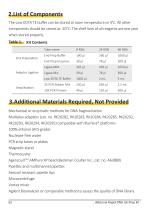
2.List of Components The Low-EDTA TE buffer can be stored at room temperature or 4°C. All other components should be stored at -20°C. The shelf lives of all reagents are one year when stored properly. Table 1. Kit Contents Tube name Adaptor Ligation 3.Additional Materials Required, Not Provided Mechanical or enzymatic methods for DNA fragmentation Multiplex adapters (cat. no. RK20282, RK20283, RK20284, RK20285, RK20292, RK20293, RK20294, RK20295) compatible with Illumina® platforms 100% ethanol (ACS grade) Nuclease-free water PCR strip tubes or plates Magnetic stand Thermocycler AgencourtTM...
Open the catalog to page 4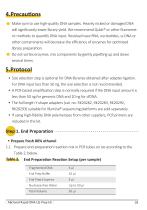
4.Precautions Make sure to use high-quality DNA samples. Heavily nicked or damaged DNA will significantly lower library yield. We recommend Qubit® or other fluorometric methods to quantify DNA input. Residual trace RNA, nucleotides, ss DNA or other contaminants will decrease the efficiency of enzymes for optimized library preparation. Do not vortex enzymes, mix components by gently pipetting up and down several times. 5.Protocol • Size selection step is optional for DNA libraries obtained after adapter ligation. For DNA input less than 50 ng, the size selection is not recommended. • A PCR-based...
Open the catalog to page 5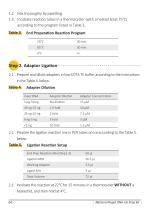
1.2 Mix thoroughly by pipetting. 1.3 Incubate reaction tubes in a thermocycler (with a heated lid at 75°C) according to the program listed in Table 3.. Table 3. End Preparation Reaction Program 20°C Step 2. Adaptor Ligation 2.1 Prepare and dilute adapters in low-EDTA TE buffer according to the instructions in the Table 4. below. Table 4. Adapter Dilution Input DNA Adaptor Dilution Adapter Concentration 2.2 Prepare the ligation reaction mix in PCR tubes on ice according to the Table 5. below. Table 5. Ligation Reaction Setup End Prep Reaction Mix (Step1.3) Working Adaptor Total Volume 2.3...
Open the catalog to page 6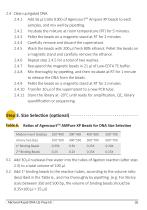
2.4 Clean up ligated DNA. 2.4.1 Add 56 μl (ratio 0.8X) of AgencourtTM Ampure XP beads to each samples, and mix well by pipetting. 2.4.2 Incubate the mixture at room temperature (RT) for 5 minutes. 2.4.3 Pellet the beads on a magnetic stand at RT for 2 minutes 2.4.4 Carefully remove and discard the supernatant. 2.4.5 Wash the beads with 200 μl fresh 80% ethanol. Pellet the beads on a magnetic stand and carefully remove the ethanol. 2.4.6 Repeat step 2.4.5 for a total of two washes. 2.4.7 Resuspend the magnetic beads in 21 μl of Low-EDTA TE buffer. 2.4.8 Mix thoroughly by pipetting, and then...
Open the catalog to page 7
Incubate at RT for 5 minutes. Pellet the beads on a magnetic stand at RT for 2 minutes. Carefully transfer the supernatant to a new PCR tube. Add 2nd binding beads to the reaction tube, according to the volume ratio described in the Table 6., and mix thoroughly by pipetting. (e.g. For library sizes between 350 and 500 bp, the volume of binding beads here should be 0.2×100 μl = 20 μl) Incubate at RT for 5 minutes. Pellet the beads on a magnetic stand at RT for 2 minutes. Carefully remove and discard the supernatant. Wash the beads with 200 μl fresh 80% ethanol. Pellet the beads on a magnetic...
Open the catalog to page 8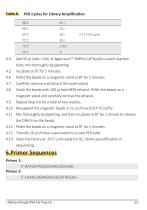
PCR Cycles for Library Amplification 98°C 98°C Add 50 μl (ratio 1.0X) of AgencourtTM AMPure XP beads to each reaction tube, mix thoroughly by pipetting. Incubate at RT for 5 minutes. Pellet the beads on a magnetic stand at RT for 2 minutes. Carefully remove and discard the supernatant. Wash the beads with 200 μl fresh 80% ethanol. Pellet the beads on a magnetic stand and carefully remove the ethanol. Repeat Step 4.8 for a total of two washes. Resuspend the magnetic beads in 21 μl of low-EDTA TE buffer. Mix thoroughly by pipetting, and then incubate at RT for 1 minute to release the DNA from...
Open the catalog to page 9
United States www.abclonal.com Address: 86 Cummings Park Dr ,Woburn,MA 01801,United States Phone: 888.754.5670, +1 857.259.4898 (Int'l) Email: service@abclonal.com
Open the catalog to page 12




